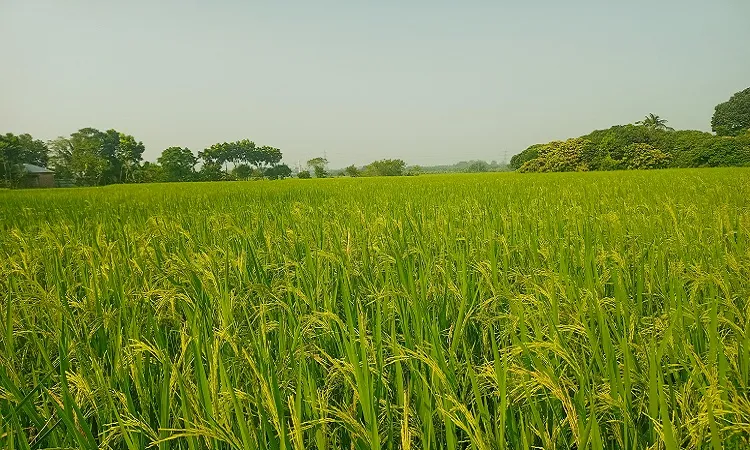


Unplanned industrialization, residential encroachment on triple-crop farmland, random pond digging, and land acquisition for the Rooppur Nuclear Power Plant have resulted in the loss of approximately 648 hectares of cultivable land in Ishwardi over the past decade. As a result, the region has seen a reduction of 935 metric tons of rice production annually.
According to data from the Ishwardi Upazila Agriculture Office, in 2015, the total cultivable land in the upazila was 18,249 hectares, which decreased to 17,601 hectares by 2025.
A significant portion of the lost land is in the char areas of Pakshi, Laxmikunda, and Nabinagar, where illegal and legal brick kilns have taken a heavy toll. The area currently has 49 brick kilns, which alone have rendered 170 hectares of farmland unusable due to constant land use for kiln setup and soil extraction.
Additionally, the Rooppur Nuclear Power Plant has acquired 294 acres of land, much of which was fertile and previously used for growing wheat, vegetables, lentils, and oilseeds. These lands have now been converted into residential and infrastructural developments, further reducing cultivable areas.
Field visits to agricultural hotspots such as Orankola Math, Baghachala, Muladuli, Khoyerbari, Patirajpur, and Arkandi reveal that vast stretches of fertile land have been overtaken by housing developments. In places like Orankola and Patirajpur, several factories have been set up, which have spurred the digging of large ponds in adjacent farmlands. The embankments of these ponds have caused waterlogging, leading to recurring crop losses.
According to the Agriculture Extension Office, over the past decade, 150 to 170 hectares of rice and vegetable fields have been lost. This has caused a sharp decline in food production, estimated at 9,350 metric tons over ten years.
Local farmer Abdur Rashid from Baghachala expressed frustration, saying, “Due to the construction of the Rajshahi-Dhalarchar railway, much land has been lost. Moreover, the railway now blocks the natural water flow, allowing us to grow only one crop per year on triple-crop land. Despite repeated appeals, we received no resolution.”
Ishak Dewan, a farmer from Orankola Math, said, “This area once produced record amounts of rice. But with the setup of farms and digging of ponds, the land has become waterlogged. Even light rainfall now submerges the paddy fields, drastically reducing yields.”
In response to this growing crisis, the Land Ministry has drafted a "Farmland Protection Act", proposing penalties of up to five years of imprisonment and a fine of up to 50 lakh BDT for misuse of agricultural land. The law also prohibits all forms of non-agricultural construction on farmland and prevents government acquisition of two or three-crop land.
Abdul Momin, Agriculture Officer of Ishwardi, stated, “Although rules mandate seeking approval from local agriculture offices before changing land use, most people disregard them. As a result, awareness is more critical than legal enforcement to prevent the reckless loss of farmland. If this trend continues, food shortages are inevitable in the near future.”
Comment